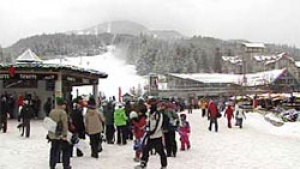Despite Intrawest’s Financial Woes, Ski Resorts Will Beat the Travel Industry Meltdown

The following commentary is offered by Ken Schapiro, President of Condor Capital:
Despite the disturbing ski industry news last week that resort operator Intrawest ULC had missed a debt payment on a $1.4 billion loan, the ski business is holding its own in the midst of nationwide travel revenue declines. All signs point toward a modest 3% to 5% revenue drop for mountain resorts nationally, which compares favorably with travel industry trends.
The bad news on Intrawest, operator of venues for the 2010 Winter Olympics, was particularly alarming because it received a 60-day extension in October for the $524 million payment owed to creditors. Olympic organizers do not expect the games to be impacted by the situation at Intrawest, which is owned by private-equity firm Fortress Investment Group LLC. Intrawest’s Whistler Blackcomb in British Columbia, site of Olympic Alpine skiing events, and other Pacific Northwest properties have taken the early season lead on snow.
Intrawest relies more heavily on real estate development than most resorts and it was acquired by Fortress at the peak of the property market, so its current situation is not surprising. With properties in the U.S. and Canada, Intrawest sells vacation timeshares and owns Canadian Mountain Holidays, the world’s largest heli-skiing operation.
The economic decline has impacted the ski industry, but not as precipitously as Intrawest. Reservations for mountain properties through November have increased two months in a row as compared to last year. Ski resorts have been fortunate because hotel occupancy nationally is at a two decade low, but preliminary reservation numbers for December are down 3.7%. Adding to the revenue woes is the fact that the snowpack in the Colorado Rockies is below average for the holidays, the busiest time of the year, meaning over half of Vail’s skiable acres are still not open.
ADVERTISEMENT
The resorts read the tea leaves from last season when numbers were down across the board and adapted their marketing strategy to make the best out of a weak market. Last season, lift ticket revenues and visits were down, but skier visits increased due to the impact of heavily discounted season passes as part of an ongoing marketing shift toward more local/regional skiers. At the same time, the resorts have been offering deals on everything from airline fares, to lessons, to food and providing package bundles that have driven prices down about 10%. Resort occupancy has increased, but revenue has declined. At 15 Westin Resorts, the average room rate is $315, down from $356 last year.
The incentive push seems to be working, and lodging and slopes close to metropolitan areas such as New York, Denver and Los Angeles stand to benefit the most as residents stay closer to home. In the end, good weather and a good deal bring out the skiers and we expect the ski market to get a boost from suggestive free advertising from the Olympics and X Games. Condor Capital is forecasting that industry revenue will be down 5% to 8% in the first half of the 2009-10 season, while remaining flat year-over-year in the second half.
Part of the revenue story is the fact that the trend in the snow sport population is toward youth. Not just in snowboarding - the fastest growing sport in America in the 1990s - but also in skiing with the advent of twin-tipped skis allowing for greater aerial possibilities. This population wants cheap passes for both skiing and on-mountain terrain parks as well as après-ski bars and village nightlife - a fact not lost on resorts nationwide.
It will be a challenging season for the mountain resorts to say the least. Reclaiming the price points and revenue of past years may not be in the offing for quite some time.

